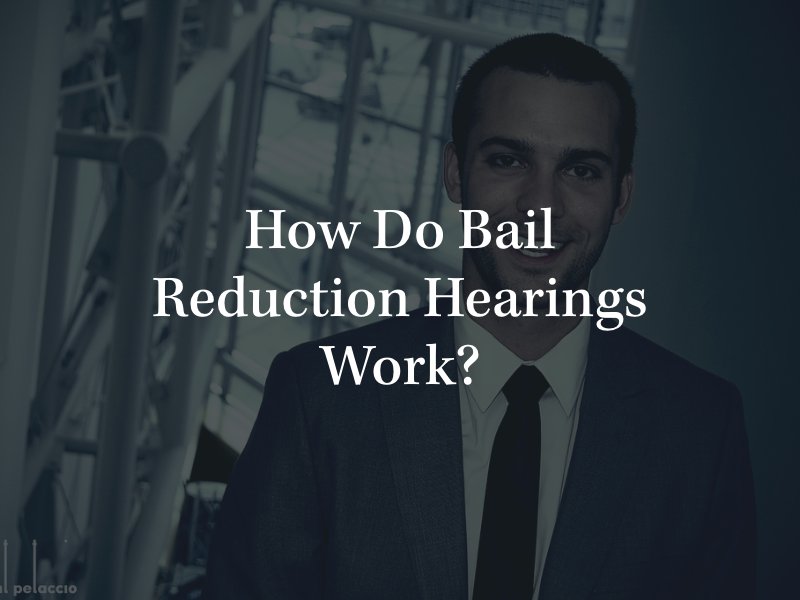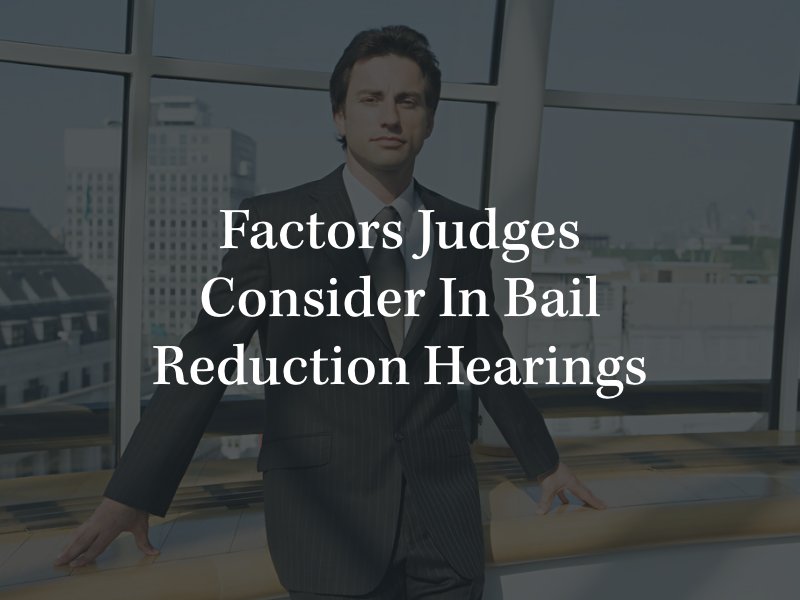When facing criminal charges, high bail amounts can create overwhelming financial and emotional burdens for individuals and their families. Bail reduction hearings offer a critical opportunity to request more reasonable terms, ensuring defendants can secure their release while awaiting trial.
The team of Chester County criminal defense lawyers with Ciccarelli Law Offices is committed to helping our clients get through these hearings and achieve fair outcomes that protect their rights and future. Here is more about how bail reduction hearings work, the various factors that go into setting bail amounts, and what to expect if your request is denied.

What Is a Bail Reduction Hearing?
A bail reduction hearing is a legal proceeding where a defendant asks the court to lower the bail amount that was initially set. Bail is intended to ensure that defendants return for their court dates, but excessive bail can unfairly penalize those with limited financial resources. Bail reduction hearings aim to strike a balance between protecting public safety and ensuring the defendant’s ability to secure pre-trial release.
These hearings are especially important in cases where bail has been set at an unaffordable amount. By demonstrating why the bail amount is excessive, we can request a reduction to a more fair amount.
Who Attends a Bail Reduction Hearing?
Several key parties participate in a bail reduction hearing. A judge oversees the proceeding, listens to arguments from both sides and ultimately decides whether to adjust your bail. The prosecutor represents the state and may argue against the reduction, citing factors such as the severity of the charges or potential flight risks. Your criminal defender advocates for your rights by presenting evidence and arguments to support your request.
In some cases, witnesses and character references may also be presented to provide additional support for your case. Their testimony can help demonstrate your ties to the community, financial hardships, or other relevant factors.
When Is a Bail Reduction Hearing Requested?
Bail reduction hearings are typically requested when the defendant or their attorney believes the initial bail amount is excessive. Common reasons for requesting a reduction include:
- Financial hardship – The defendant cannot afford the bail amount set.
- Unnecessary restrictions – The bail conditions are overly harsh given the circumstances of the case.
- Changed circumstances – New information has come to light that warrants a reconsideration of bail.

Factors Judges Consider in Bail Reduction Hearings
Nature and the Severity of the Charges
The judge will carefully evaluate the seriousness of the charges when deciding whether to reduce bail. If you are facing violent felony charges or offenses involving significant harm to others, you may encounter stricter bail conditions. Conversely, if you are charged with a non-violent or lesser offense, you may have a stronger case for a reduction.
Defendant’s Criminal History
Your criminal record plays a significant role in bail decisions. If you have prior convictions or a history of failing to appear in court, you may face higher bail amounts. On the other hand, a clean record can support our argument for more lenient terms.
Flight Risk and Ties to the Community
Judges also consider the defendant’s likelihood of appearing in court if released. Factors such as stable employment, family connections, and long-term residency in the area can demonstrate strong ties to the community, which could reduce the judge’s concerns about flight risk. If you lack these connections, you may need to present additional evidence to strengthen your case.
The Legal Standards for Bail in Pennsylvania
Presumption of Innocence
Under the U.S. Constitution and the Commonwealth of Pennsylvania under Section One of the 14th Amendment of the United States Constitution, all defendants are presumed innocent until proven guilty. Bail decisions must reflect this principle, ensuring that pre-trial detention does not unfairly punish individuals who have not been convicted.
Excessive Bail Prohibited
The Eighth Amendment of the U.S. Constitution and 234 PA Code Rule 523 prohibit excessive bail. Bail amounts must be reasonable and proportionate to the offense while considering the defendant’s ability to pay. If the bail is set too high, it effectively denies the defendant their right to pre-trial release, undermining the justice system’s fairness.
How to Prepare for a Bail Reduction Hearing
Gathering Evidence
Successful bail reduction hearings often hinge on thorough preparation. We should gather relevant evidence, such as pay stubs, tax returns, or other financial documents that could prove your inability to pay the current bail amount. Character references from employers, religious leaders, or community members can also provide valuable support.
Crafting Legal Arguments
Your DUI defense lawyer in Philadelphia with Ciccarelli Law Offices can play a critical role in crafting compelling arguments for a bail reduction. This includes highlighting the defendant’s ties to the community, lack of criminal history, and commitment to complying with court orders. By presenting a well-reasoned case, we could persuade the judge to set a more reasonable bail amount.
Anticipating Counterarguments
Preparation should also include addressing potential objections from the prosecutor. For example, if the prosecutor argues that the defendant poses a flight risk, we can counter by presenting evidence of stable employment or family responsibilities. Anticipating these challenges can help to ensure we are ready to respond during the hearing.
Can Bail Be Denied or Increased Instead?
In certain cases, bail may be denied entirely, such as for serious violent offenses or when the defendant is considered a significant flight risk. Requesting a bail reduction can sometimes backfire if the court determines that the initial bail amount was too low. For example, if the prosecutor presents evidence suggesting the defendant is at a greater risk than previously understood, the judge may decide to increase bail instead.
Risks of High Bail Amounts
Excessive bail amounts can place an unbearable financial burden on you and your family. Many people are forced to take on high-interest loans or sell personal assets to cover bail, creating long-term financial instability.
If you cannot afford bail, you may have to remain in custody for weeks or even months while awaiting trial. This can lead to significant disruptions in your life, including loss of employment, housing, and critical family relationships.
High bail can also be predatory. It is not unusual for defendants to feel coerced into accepting a plea agreement, even when they believe they are innocent, simply to secure their release.
Get Help Advocating for Fair Bail Terms with Ciccarelli Law Offices
Excessive bail should never prevent you from fighting for your case and protecting your rights. At Ciccarelli Law Offices, Our criminal defense attorneys are dedicated to helping you secure fair bail terms through personalized legal representation and skilled client advocacy. Contact us today by phone or through our online contact form to discuss your case and learn how we can assist with your bail reduction hearing.
